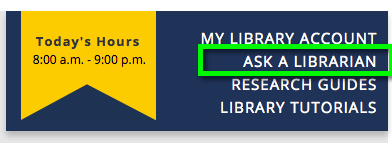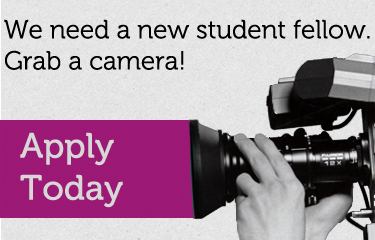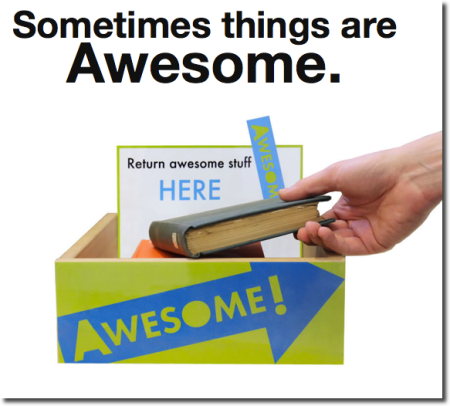The College website’s redesign and move to WordPress over the Winter Break meant BIG CHANGES for the Library’s website. One of the biggest and best changes was the integration of a new blog with the library’s web presence. As a result of this new development, we will no longer be updating Beyond the Bookshelves, this blog. Instead, you can follow the library’s NEW BLOG. There you’ll find the same news, announcements, and opinions from your favorite librarians you’ve come to enjoy here. Take a look and go ahead and follow us!
Author Archives for Veronica Arellano Douglas
Welcome Back!
Welcome to the start of another amazing academic year at St. Mary’s. You may not realize it, but by this time the librarians and library staff have had enough of the quiet summer days and are so very excited to see you again! If you’re a student, come by the library to say hello in between classes, and while you’re here you can:
- Check out a laptop if your computer is on the fritz during the first week of classes.
- See what your professor has placed on Course Reserve for the semester.
- Print out your syllabi for the semester.
- Start digging in to your SMP lit review (if you’re at that point)!
For faculty, don’t forget that the library
- Has an all-campus subscription to both The Chronicle of Higher Education AND The New York Times. For full access to content, you just need to register with your St. Mary’s email address.
- Is still taking requests for Course Reserves. You can find the online forms for Course Reserves requests on the Portal under the Faculty Tab.
- Has librarians who can teach research workshops for you this semester. Just ask us.
See you soon.
Why Net Neutrality Matters to You (and Libraries)
Depending on your personal news filter bubble, you may or may not have heard the phrase “net neutrality” discussed in the news quite a bit lately. If you don’t think of yourself as a “tech-type,” you may have been tempted to ignore these stories. “What impact could they have on my day-to-day life,” you might have asked yourself? The answer is, quite a lot actually.
At the risk of sounding trite, I think it’s worth restating just how much our daily lives revolve around our access to the Internet. When the campus network is down we wonder what work we’re supposed to get done all day. When Facebook or Twitter crashes we’re left unconnected from our friends and families. Many of us (myself included) have cancelled all cable access and rely on streaming video over the internet for our news and entertainment.
Although there may be only a small portion of the web that we each call “home”–those websites and apps we visit and use on a daily basis–we all assume that by virtue of having Internet access we technically have equal access to all information we might ever want online. This has never really been true, but if the push for net neutrality fails, this will dramatically impact the way we gain access to content online.
In plain language (thank you Electronic Frontier Foundation), net neutrality is “the idea that Internet service providers (ISPs) should treat all data that travels over their networks equally.” Without it, cable and DSL companies would be able to provide faster connections to websites and services that pay for this improved access. Great, you may be thinking. Then maybe when I try to watch Netflix on a Saturday night it will stop buffering in the middle of an Orange is the New Black episode.
Wrong.
Privileging access to some content over others means that the ISPs (Comcast, Verizon, AT&T, etc.) have the real power over your life online. If Comcast and Amazon strike a deal for faster access to their streaming video content you might find yourself out of luck if you’re trying to access HuluPlus. More importantly, what happens to start-ups, non-profits, and educational institutions (like libraries or non-profit online education programs) that don’t have the kind of funding that private enterprises do to guarantee that their content is privileged online? Accessing their content will be slower, more difficult, and not as easy as it is now.
On May 15, the FCC voted 3 to 2 to consider two primary options for the future of net neutrality:
- The FCC would require ISPs to provide a basic level of internet service, then they could charge businesses to deliver their content faster.
- Internet access would be re-classified as a public utility, which would give the FCC greater regulatory power to ensure net neutrality.
Naturally, librarians are big net neutrality proponents, as are the folks at the ACLU, Electronic Frontier Foundation, but also, perhaps not unexpectedly, artists and musicians who rely on the Internet to get their content out to the masses and build a fan base. The internet giants aren’t staying silent either. Facebook, Netflix, and Amazon all have made an official statement in favor of net neutrality as have 150 other internet companies. It simply isn’t in their business interest to pay more to deliver their content.
The next time NPR has a story on net neutrality, turn it up. It’s worth a listen.
SMCM Library on YouTube
I suspect that not many people know this, but the SMCM Library has its own YouTube channel. Why would a library need a YouTube channel? Good question.
The library is a swiftly changing place. From week to week or month to month there is always something new: a new journal we just picked up, a new database we now license, or a new service we are piloting. We’re anything but stagnant, and we thought that creating fun videos to publicize library services and collections would be a great way to let you know what’s happening within the library’s walls.
As I’ve mentioned before, the library hired a fantastic student this fall, Eden Anbinder, to create publicity videos for the library. You can view them all at our library’s YouTube channel. They’re short, fun, goofy, and entertaining. You might even learn something in 1 minute or less!
End of Semester Countdown
It’s that time of year again: The extension cords are all checked out, the coffee is flowing, and suddenly anyone speaking above a whisper in the library is TOO LOUD!!!!! With only a few days of classes left and final exams looming on the horizon, the library is here for you.
You can find our Final Exam week (and Winter Break) hours online, but essentially we’re open until 2 a.m. Sunday, Dec. 15 – Wednesday, Dec. 18. As always, librarians are around to help with any last-minute research assignments, and all of our e-books and online databases are available 24/7. If you come by for some last minute studying, you might even find a certain library director whose name rhymes with Shmelia handing our power snacks and goodies when you least expect it. Don’t say we didn’t warn you.
Our Video Project Returns (and it’s good y’all)
This fall the library was granted another year of funding through the Career Development Center’s Professional Fellowship Program to hire an instructional media fellow. Our hire this year is Eden Anbinder, a Computer Science major, video hobbyist and all-around creative human being.
Thanks to some fantastic TFMS coursework, a great sense of humor and innate talent, Eden has developed two a new short film about eBooks (EBooks: You Decide!), which is a spoof on 1950s instructional videos, and a short video about our new Films on Demand streaming video database.
Take a minute or two, relax, and enjoy the show:
Do You Zinio?
I really should be sharing information about what we offer at our own library, but sometimes other libraries are doing something so cool I have to spread the word. After all, publicizing any one library is really good for all libraries, isn’t it?
Our local public county library is now offering access to dozens of magazines online, FOR FREE, through the magazine viewer service Zinio. It is AMAZING. You can check out as many magazines as you want (no limit!) and keep them for as long as you want. They’re all full-color replicas of the magazines online, so they look exactly the same as their print counterparts, only without all the annoying fragrance samples and subscriber cards. You can download these magazines and read them on your computer, or on you your tablet or smartphone using the Zinio app. All you need is a St. Mary’s County Public Library card.
I’m off to read Martha Stewart’s Living, Interweave Knits, and the latest issue of Marie Clare (but if you’re into Newsweek and Popular Science they’re available too). Check out Zinio today and browse for your favorite magazine.
Have a Question? Find an Answer.
We get it. Sometimes you have a quick question and don’t want to bother to call, email, or ask us in person. Sometimes you just need to type a question into your iPhone and get an answer. Quickly.
In those situations, we have you covered. It’s a perfect opportunity to check out our collection of Frequently Asked Questions through our Ask a Librarian page.
Not sure how to download Endnote? Need to access online databases from off-campus? Curious about the dates of this year’s Library Book Sale? Our FAQs have you covered. The best part is that you can literally type in a question and get an answer.
Please note: Although we try to keep our FAQs well stocked with useful questions, you may have a question we just haven’t posted an answer to yet. In that event, you’ll simply be prompted to email your question and a librarian will soon.
Now Hiring: Library PFP position, Instructional Media Fellow
The SMCM Career Development Center has a fantastic Professional Fellowship Program for interested sophomores, juniors, and seniors. You can get a great internship-like experience at a greater pay rate ($10 / hour) than your average student worker. Last year, the library’s PFP student, Taylor Robb-McCord, started work on a new video series: The SMCM Library in 60 Seconds. This year, we’re looking for a new PFP student to continue the series and put their own creative spin on it.
We’re calling our PFP position an Instructional Media Fellowship. You can learn more about it on the CDC website, but here’s a brief description:
The library is seeking a creative student interested in video production or advertising to help develop the “SMCM Library in 60 Seconds” video series. The fellow will develop instructional videos promoting library services and resources to the SMCM community.
To apply, email me, Veronica Arellano Douglas with your
- resume
- cover letter describing your interest in and fit for the position as well as your cumulative GPA and
- contact information for one faculty/staff reference.
You can also call (240-895-4265) or email me with questions about the position!
Too Awesome Not to Share
As Celia mentioned in her last post, librarians have a long tradition of upholding library users’ privacy. It’s in our professional Code of Ethics!
We protect each library user’s right to privacy and confidentiality with respect to information sought or received and resources consulted, borrowed, acquired or transmitted.
Code of Ethics of the American Library Association (last amended Jan. 2008)
We’re quite good at making sure that library users’ records and web browsing sessions are kept private (or not kept at all), and have a great history of standing up to legislation we see as infringing on users’ right to privacy (see the NYTimes article in which we receive the now infamous radical militant librarians label, then see us put it on a t-shirt). In general, people love us for this, but people also love social media, online shopping recommendations, and seeing what their best friends just bought on Etsy. There’s a weird conflict between the kind of privacy people say they want and the kind of privacy infringement they’re willing to put up with in order to have a personalized online experience. Libraries have largely stayed out of it, but recently I came across this really cool initiative that seems to have a good balance of user privacy and personalized recommendations.
Behold, THE AWESOME BOX:
This project is the brainchild of the Harvard Library Innovation Lab and is being implemented at not only Harvard but a select group of public and academic libraries in the U.S. The concept is simple: Think something is awesome? Return it to a special “awesome box” or flag it with an “awesome bookmark” and library staff will scan it and have it magically appear on that library’s Awesome Page. What you read remains private, but you now have a better sense of what your fellow-library-goers are reading, watching, and listening to throughout the year.
Plus who doesn’t need a little awesome in their day?
What are your thoughts on the Awesome Box? Would something like it fly at St. Mary’s?




